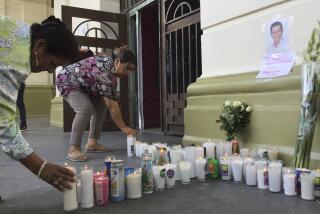Nagasaki mayor killed; Japanese gangster blamed
- Share via
TOKYO — Japanese police were trying to determine what may have motivated a high-ranking Nagasaki gangster suspected of shooting the city’s mayor at close range Tuesday, fatally wounding the politician and conjuring dark memories of political violence in Japan.
Nagasaki Mayor Itcho Ito died early today of blood loss and heart failure about six hours after being struck twice in the back by shots fired on a busy sidewalk in front of a major Nagasaki train station. The mayor had just stepped out of a van after a day of campaigning in the southwestern Japanese city perhaps best-known as the second city devastated by an American atomic bomb in 1945.
He was running for a fourth four-year term in municipal elections scheduled for Sunday.
Police identified the suspect as Tetsuya Shiroo, 59, described as the acting chairman of the Suishin-kai, a local gang affiliated with the national Yamaguchi-gumi crime syndicate.
Police raided Shiroo’s home this morning in search of a motive. They are focusing on a dispute Shiroo had with Nagasaki city authorities over damage to his Mercedes when he drove it into a hole caused by road construction in 2003.
City officials said he had visited their offices more than 30 times in an attempt to get compensation after the city had sided with the construction firm in rejecting his damage claims.
But there were also reports that Shiroo’s Suishin-kai was unhappy over losing what it believed to be its share of city construction contracts.
Witnesses said Shiroo put up little resistance as he was tackled by members of the mayor’s staff, who pinned him to the ground until police officers arrived and bundled him into an unmarked police car.
Shiroo was reported to have held the gun aloft in his right hand after the shooting, and police said he confessed to the killing almost immediately.
Acknowledging guilt and providing police with the weapon is a tradition in the culture of Japanese criminal gangs, which operate in a semi-open fashion that includes maintaining offices and informal links to police and politicians. But the yakuza, as they are called in Japan, have generally frowned on the killing of public officials and on violence that intrudes into civilian life.
Observers say that yakuza violence is increasingly creeping into public spaces, as the syndicates have come under greater financial and police pressure in recent years and gangs have been forced to recruit more “part-time” members.
Once dependent on prostitution, extortion and other illegal activities, the yakuza have set up front companies in real estate, construction and even information technology, experts say.
That shift has left the yakuza vulnerable to wider changes in Japanese society. Japanese municipalities were once flush with cash from a political system that relied on politicians in the governing Liberal Democratic Party dispensing public funds to local supporters, notably construction companies.
The mutual back-scratching system was attacked by the previous prime minister, Junichiro Koizumi, who saw the link as a cancer to Japan’s political and economic health. Koizumi’s government cut the spigot of public money that sustained it.
The fallout has also been felt by local yakuza gangs, who are under pressure to kick money up to national syndicates such as the Yamaguchi-gumi.
“Affiliated groups at the bottom have to contribute, and it is getting harder for local yakuza groups to generate income,” said Takahashi Kadokura, an economist who has written several books on Japan’s underground economy. “Rural areas depended on the public works budgets that have been cut by the Japanese government.”
The focus on Shiroo’s alleged rage at city officials tempered initial alarm that Ito’s killing may have been a conspiracy by nationalist extremists to silence a politician linked to pacifist causes. As Nagasaki’s mayor, Ito was a forceful anti-nuclear advocate, who used the pulpit provided by the city’s tragic legacy to press that message in Japan and abroad.
His killing sent a collective shudder through the country, in part because his predecessor was the target of an assassination attempt. In 1990, Mayor Hitoshi Motoshima was shot by a nationalist fanatic angered by the politician’s comments suggesting that Emperor Hirohito bore some responsibility for the wartime catastrophe.
Motoshima survived, and went on to serve a fourth term. He was defeated by Ito in 1995.
Unlike the left-wing Motoshima, Ito was a postwar baby boomer who initially argued that moralizing over the Nagasaki bombing should be left to the national government, while local politicians focused on economic and social issues closer to voters’ daily lives. Over the years, he came to embrace the belief that speaking out against nuclear weapons’ proliferation was a fundamental part of any Nagasaki mayor’s job.
But Ito remained a mainstream Japanese politician. Though he campaigned as an independent, he enjoyed the support of the Liberal Democratic Party political machine, making him a less likely target for nationalist extremists.
*
Hisako Ueno of The Times’ Tokyo Bureau contributed to this report.
More to Read
Sign up for Essential California
The most important California stories and recommendations in your inbox every morning.
You may occasionally receive promotional content from the Los Angeles Times.













